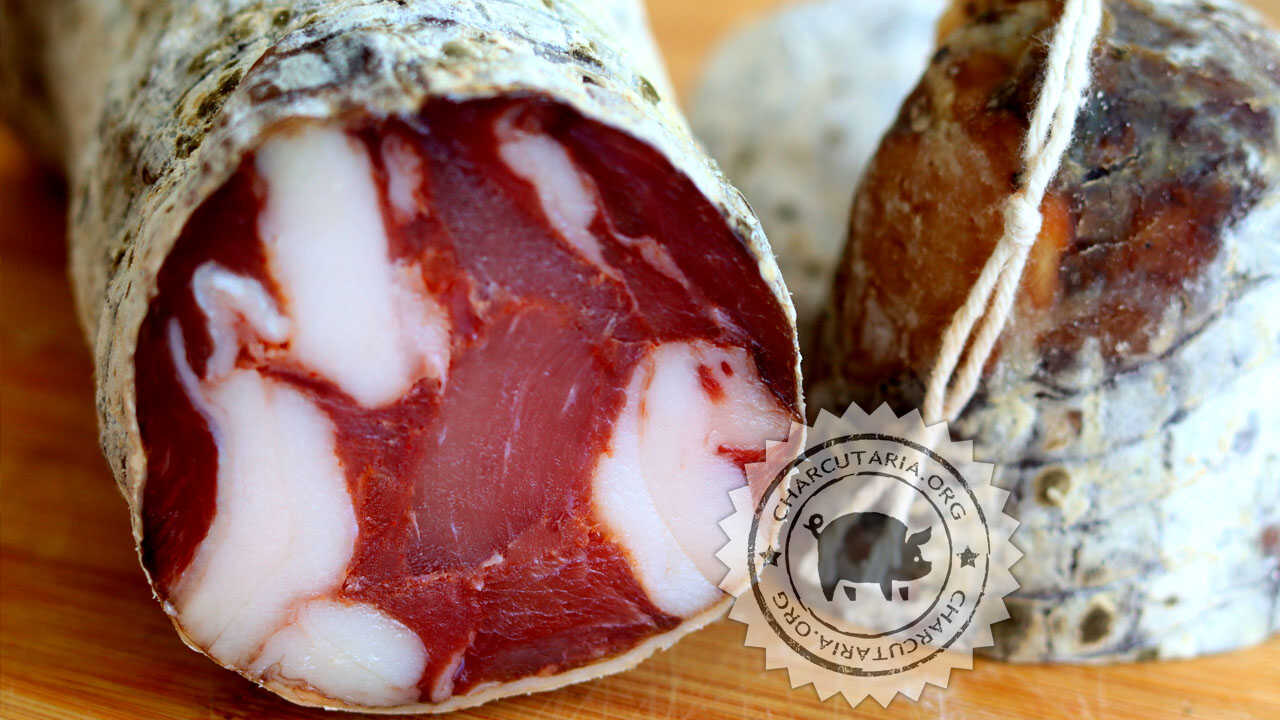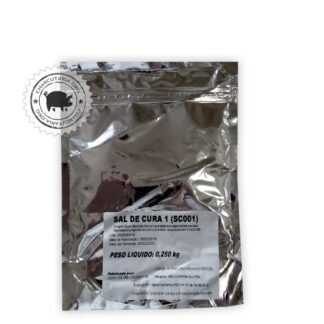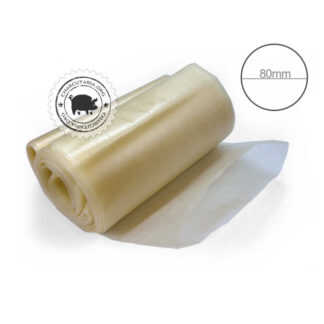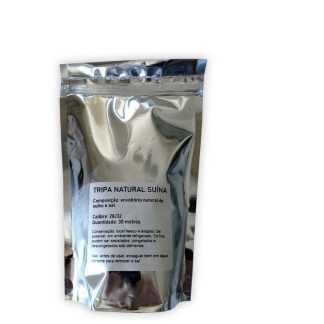
Este salame rústico foi inspirado no tradicional salpicão português, que é um embutido ou, como se diz em Portugal, enchido, feito com o lombo suíno, preferencialmente da raça Bísara, cortado em cubos de aproximadamente 5 cm, temperado com vinho, sal, alho, louro e pimentão. Após a condimentação é deixado marinando, ou curando, durante quatro dias. Tradicionalmente o salpicão é defumado e depois maturado, mas nesta variação foi feito sem a defumação.
Caso opte por defumar, deve ser feito em temperatura moderada, preferencialmente com lenha de carvalho ou castanheiro. Terminada a defumação, segue-se um período de cura(dessecagem) em local escuro. O período de defumação e cura deve ser de, no mínimo, 40 dias.
Ingredientes
1kg de lombo de porco;
100ml de vinho tinto;
18g de sal;
18g de alho amassado;
3g de páprica;
3g de sal de cura tipo 2*; (6% de nitrito, 3% de nitrato e 93,75% de sal)
3g de antioxidante com eritorbato**;
5 folhas de louro;
1 unidade de fundo bovino.
* sal de cura 2 é uma mistura de sal, nitrito e nitrato, obrigatório em embutidos cárneos comercializados no Brasil. É um conservante que inibe a proliferação de bactérias, como a do botulismo. Para consumo próprio o uso é opcional, mas recomendável.
** antioxidante com eritorbato atua em conjunto com o sal de cura e na prevenção do ranço. Para consumo próprio o uso é opcional, mas recomendável.
Modo de preparo
Cortar o lombo em pedaços de aproximadamente 5 cm;
Misturar à carne o alho amassado, sal, louro, vinho e páprica;
Deixar por 4 dias na geladeira;
Lavar bem a tripa, retirar as folhas de louro da carne e embutir;
Caso opte pela defumação, defumar por uma noite em temperatura baixa, até 45ºC;
Pendurar em local frio por até 40 a 50 dias;
Deve ser servido cru, fatiado em rodelas, como aperitivo ou acompanhando um bom pão, queijo e vinho.
Maturação
Peso inicial, dia 05/03: 1396 gramas
Peso final, dia 25/04: 750 gramas, perda de 47% do peso inicial em 51 dias.












Bom dia, fiz essa receita do jeito que está no site, uso câmara de maturação tbm, porém o salame ficou opaco e com espaços entre os pedaços de carne, usei tripa de colágeno e rede elástica, ficou bem apertado. Onde posso estar errando?
Quando isso ocorre, geralmente houve muita acidificação no salame, pode ser proveniente de alguma contaminação que fermentou. Pendurou em um local frio?
Bom dia.
Qual o prazo de validade deste salame rústico? E qual o tamanho da rede elástica?
Bom dia.
Qual o prazo de validade deste salame?
Boa tarde parabéns pelas postagens e receitas . Posso trocar o fundo bovino por tripa de colágeno ???
Sim, pode usar a tripa de colágeno que é muito boa, inodora e fácil de usar.
Buenas saludos desde venezuela realicé este producto de sabor resultó espectacular pero al momento de rebanar se separaba todos los trozos. Sabes a qué se debe?
Boa tarde
Não há a necessidade de fermentar entre 48 e 72 horas antes de colocar para maturar como geralmente nos demais salames?
Oi Rodrigo, só é recomendável fermentar quando é feito uso de cultura starter. Caso contrário estará proporcionando um ambiente favorável para a proliferação de microbiologia desconhecida. Neste salame acrescentei bastante vinho, então não coloquei a cultura para não acidificar demais. Por isso não fermentei.
Bom dia
Vou tentar fazer metade fermentando com cultura starter e outra metade sem para comparar depois.
Muito top suas receitas e vídeos. Sou fã!